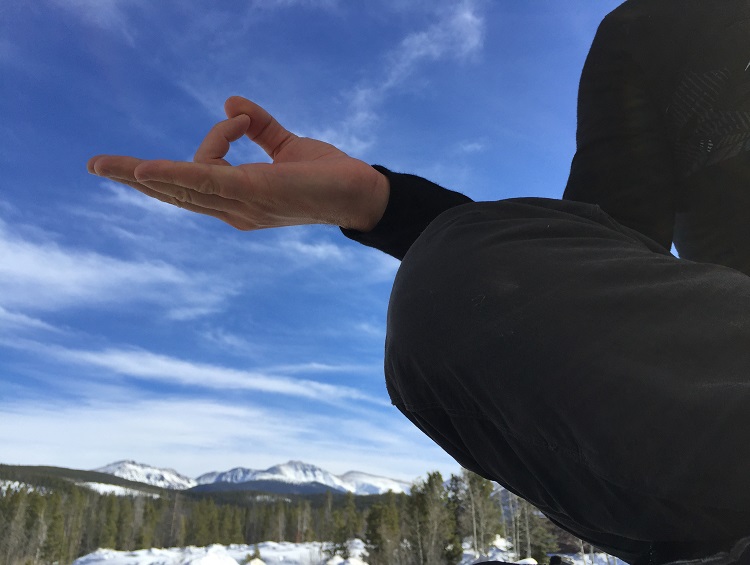It was a brisk fall morning in September as I found myself sitting in my car sipping tea watching the sun stream through the trees. I was parked in front of an old stone building in Boulder with a sign out front, which read “Shambala Institute”. I felt a bit of trepidation and was stalling to go inside the building. I signed up for a 3-hour introduction to meditation class. I never really meditated; I would try in yoga and would end up falling asleep. Was I sure I wanted to do this? How can I meditate for 3 hours, I can barely keep my mind focused for 3 minutes? I immediately responded to my thoughts. I said to myself, ‘this is exactly why I am here, why I planned a month in advance, organized child care, and reserved a Saturday away from my family so I COULD focus my mind longer than 3 minutes’. I did end up taking the class, which was a very gentle introduction to meditation. And we did not meditate for 3 hours straight, the longest meditation was 15 minutes.
What prompted this interest in meditation? I felt I needed more tools to help with my life shift. I just had a baby, resigned from my job and left a community and career that was integral in my life for 12 years. I was feeling very uprooted and I needed some grounding. I didn’t know much about meditation, yet I had friends who meditated that shared the benefits they received and they suggested meditation would help me too.
I did not have a plan of meditating as a daily practice. Yet once I experienced the class, I enjoyed how I felt after meditation. When I returned home, I meditated the next day, and the next until a daily routine snuck into my life. I began meditating every day for an average of 10 minutes.
After a month of daily meditation practice I began to notice some surprising changes. I first noticed that I was not anxious about things that would normally wind me up, such as what I will do for my next career. I generally felt more at peace and trusted that things would work out. I was also less fearful and stressed, specifically about being outside my comfort zone. Now this isn’t to say that I always take the safe route, I lived in 2 foreign countries sight unseen. But before I jumped into such adventures, I would spend countless hours obsessing and researching the best choice. It was incredibly draining. Once I was in the flow of meditation the usual anxiety, fear and stress seemed to have melted away. I was more decisive, confident and willing to push my boundaries with a lot less discomfort. These were HUGE differences in my way of being that was completely unexpected.
Once I became aware of the benefits of meditation, I wanted to know the science behind meditation and its positive affects. The most researched type of meditation is mindfulness meditation. This type of meditation is the style I practice, which has the practitioner focus on the present moment, focus on breathing and not engage with thoughts that arise.
How does meditation reduce anxiety? There was a study performed at the Wake Forest Baptist Medical Center on the affects of meditation on specific areas of the brain. Fadel Zeidan, Ph.D. the lead author of the study states, “In this study, we were able to see which areas of the brain were activated and which were deactivated during meditation-related anxiety relief.” In this study, volunteers with no previous experience meditating meditated for 20 minutes four different times. Before and after each meditation session, the volunteers had anxiety reports and brain scans. The study found, “During meditation, there was more activity in the area of the brain that controls worrying (ventromedial prefrontal cortex). In addition, when activity increased in the area that governs thinking and emotion (anterior cingulate cortex) anxiety decreased.” Meditating for 20 minutes resulted in a decrease in anxiety by 39%. And this reduced anxiety by meditation can benefit anyone, including those with no experience, just like me.
How does meditation reduce fear and stress? I was driving one day listening to NPR’s Fresh Air feature program, “How Meditation, Placebo’s And Virtual Reality Help Power ‘Mind Over Body’”. Author and PhD scientist Jo Marchant, was speaking to my exact question, How does meditation reduce fear and anxiety? Once again it came down to what happens in specific areas of the brain during meditation. Marchant starts with explaining that a person whom has chronic stress has a brain that looks different from a person whom is not chronically stressed. Marchant describes, “In brain scans, the area of the brain that deals with fear and threats (amygdala), is larger in people whom have been chronically stressed. Other areas of the brain that have to do with rational thought and planning (hippocampus and prefrontal cortex) get smaller over time.” If you were to do a brain scan of people whom consistently meditate over a long period of time, the results are in reverse. The amygdala becomes smaller and the hippocampus and prefrontal cortex grow larger. Meditation can beneficially change the structure of your brain.
Meditation can have very immediate results of reducing anxiety, fear and stress in beginning practitioner. Yet in order to have long lasting results, like any other health regime of eating well and exercise, a consistent practice is essential. In my next article I will offer multiple modalities to make meditation an easy and accessible part of your daily routine.
- Study: http://www.wakehealth.edu/News-Releases/2013/Anxious_Activate_Your_Anterior_Cingulate_Cortex_With_a_Little_Meditation.htm
- Program: http://www.npr.org/sections/health-shots/2016/01/26/464372009/how-meditation-placebos-and-virtual-reality-help-power-mind-over-body




